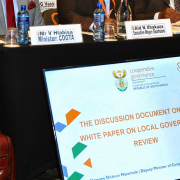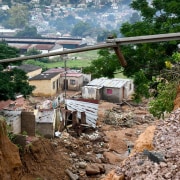|
Getting your Trinity Audio player ready...
|
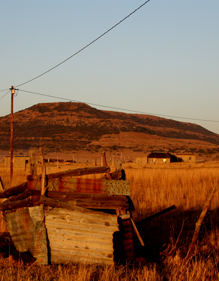 For many the idea of living in the countryside conjures up images of peace and serenity – and this can be felt while driving through the vast open lands of the Amantungwa clan in Utrecht, 50km outside Newcastle in KwaZulu-Natal. You can immediately feel the tranquillity there.
For many the idea of living in the countryside conjures up images of peace and serenity – and this can be felt while driving through the vast open lands of the Amantungwa clan in Utrecht, 50km outside Newcastle in KwaZulu-Natal. You can immediately feel the tranquillity there.
But beneath the façade of pastoral bliss is a clan divided by allegations of corruption, nepotism, a disputed chieftaincy and betrayal by a mining company. Read more about the area and its people here.
Corruption Watch visited Utrecht after receiving a complaint from an Amantungwa clan member questioning the legitimacy of their current chief, Patrick Sphamandla*. It is alleged he was appointed without the community’s consent.
The complainant accused the Department of Traditional Affairs of recognising Sphamandla as the chief even though, according to traditional law, a chief should first be identified by the entire royal family which then recommends the chosen individual to government. Only then can the premier appoint someone as chief. This process was not followed in the case of Sphamandla.
The complainant accused Sphamandla of outsourcing the land of Amantungwa to farmers for personal benefit, the theft of an irrigation system that cost over R1-million, and benefiting from leasing communal land and charging R1 000 each for the building of shacks on properties that rightfully belong to the clan.
“Corrupt government officials are using a family member [chief Patrick Sphamandla] to gain access to Amantungwa land, undermining the rightful custodians,” the letter of complaint read.
The complainant also alleged that a mining company, Khethekile Mining, operating on land that the clan had claimed, promised to develop the community once the mine opened. However, it had not lived up to its promises.
To verify these allegations, Corruption Watch first met with the late acting chief Latu Robson’s wife Ndlunkulu* at the royal house. The meeting was attended by various community role-players, including clan members and trustees of the Amantungwa Development Trust.
During the meeting the organisation heard that the crisis in Utrecht went far beyond a battle for leadership … Read the full timeline of events here.
Fight for land, discovery of coal
A stern woman and clearly respected by the community, Ndlunkulu first told Corruption Watch about the history of Amantungwa and how her late husband worked tirelessly to regain land that was stolen from them during colonial rule.
In the 1980s Latu Robson* made a number of representations to various forerunners of the Department of Land Affairs requesting that certain land parcels in the Utrecht area be returned to the Amantungwa community.
In 1997, three years 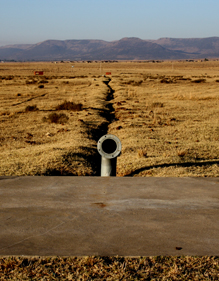 after South Africa’s Commission on Restitution for Land Rights was established, the community opened a trust called the Amantungwa Development Trust which would take ownership of the territory once the land claims had gone through.
after South Africa’s Commission on Restitution for Land Rights was established, the community opened a trust called the Amantungwa Development Trust which would take ownership of the territory once the land claims had gone through.
Latu Robson launched a claim for 131 properties on behalf of Amantungwa community.
In 2007 the land commission advised Latu Robson to open a new trust called Izimbuthu Community Trust, saying this would help speed up the claim process. Eighteen farms out of 131 initially claimed were then transferred into Izimbuthu and eager beneficiaries moved onto the land to begin farming.
But in a bizarre move three years later, the land commission met with the Izimbuthu Community trustees and recommended the new trust be dissolved, citing the reason that having two trusts caused confusion in the community.
The commission told the community the 18 farms would then be transferred into the original trust, Amantungwa. But two years on, nothing has happened.
In the meantime seams of coal were discovered beneath Uitkomst 95, one of the properties that Amantungwa was claiming. There was hope for prosperity for all community members as the mining company, Khethekile, promised to give them a 26% share of the mine; build roads and schools; and employ locals to work on the mine.
When nothing came of this, the community looked up to one of its own to stand up for them. But it seems, in the appointment of Sphamandla as chief, such hope also began to dissipate.
The rise of Patrick Sphamandla
Sphamandla rose to prominence in 2007, around the same time the coal seams were discovered and the second community trust was set up.
Latu Robson had been ruling as acting chief of Amantungwa for over two decades, when Sphamandla’s father, Simon Mgobo*, wrote a letter to the Department of Traditional Affairs in 2006 demanding that the chieftaincy be returned to the rightful house.
A family tree was then drawn up at Madadeni magistrate’s office, confirming that Sphamandla was next in line to be chief.
After a five-year disp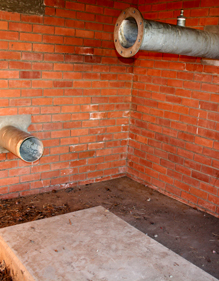 ute, Sphamandla was appointed chief. Since he took over the reins Patrick Sphamandla has, according to the community, done nothing to uplift Utrecht. While the residents live in dire conditions, the Department of Traditional Affairs has built him an enormous house.
ute, Sphamandla was appointed chief. Since he took over the reins Patrick Sphamandla has, according to the community, done nothing to uplift Utrecht. While the residents live in dire conditions, the Department of Traditional Affairs has built him an enormous house.
In addition, his close ties with Khethekile have only benefited him and his brother Bongani*, who in just four years rose from being an intern to one of the company’s directors.
With this information in hand, Corruption Watch arranged to meet with a Khethekile representative and Sphamandla to give them an opportunity to respond to the allegations the community had levelled against them.
Chief tries to hide his identity, reporter threatened
It is 4:30pm at Khethekile Mining offices in Newcastle. Sphamandla, Bongani and the financial director of Khethekile Mining Johann Wagner meet Corruption Watch.
Sphamandla acted shadily from the onset claiming he was a “lawyer” and denied that he was the chief until Wagner confirmed the truth.
The chief then demanded that the recording device be switched off and later, when the Corruption Watch journalist refused, he attempted to turn it off himself.
He declined to comment on the allegations against him, asserting that “he is a chief and not a boy”. But he was quick to show the journalist a picture of his house and car on his phone, adding that those who were accusing him of corruption were jealous of his possessions.
Restless throughout the meeting, Sphamandla kept rising from his chair in anger. Each time, Bongani and Wagner tried to calm him down. But this didn’t stop him from threatening to get the reporter arrested for no reason.
Shifting our attention to the mining company, Corruption Watch demanded an explanation for why the mine had not developed Amantungwa community as it had promised. Wagner said Khethekile did not own the mine, it was only contracted to excavate in the area so it wasn’t their responsibility.
It was revealed that the mine is owned by a company called Brandywine Valley Investments.
The land on which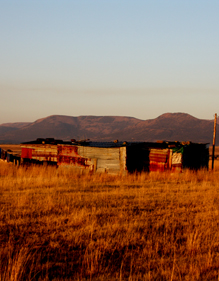 the mine is situated does not belong to Amantungwa, but to another individual Jabulani Msibi and his clan, said Wagner.
the mine is situated does not belong to Amantungwa, but to another individual Jabulani Msibi and his clan, said Wagner.
When asked why his company held meetings with Amantungwa community prior to the mine opening if his company did not own the mine, Wagner contradicted what the Amantungwa had told Corruption Watch, denying that such meetings ever took place.
Sphamandla then called Jabulani Msibi to join the discussion with Corruption Watch. Upon arrival, Msibi confirmed that the land where the mine is situated, Uitkomst 95, belonged to his community.
A clearly agitated Msibi, who is also a director at Khethekile, said his clan had lived in Uitkomst for a long time.
He echoed Wagner, saying there were never any meetings between Khethekile and Amantungwa, and challenged the community to prove the company had made promises to them.
At the end of the meeting Sphamandla insisted that Corruption Watch attend a community meeting to get the facts straight, and threatened the reporter with violence, saying: “Even the people, they’ll burn you”.
Another meeting was set up with Sphamandla’s brother Bongani for the next day – during this meeting the he refuted allegations of corruption facing his sibling.
Farmers kicked off their land
Meanwhile, 15 families have been kicked off their farms which are now being rented out to commercial farmers. The community is yet to see the income from this lease deal.
A resident, Philani*, told Corruption Watch that a group was chased off their farms in 2010 and were forced to return to where they were living previously.
“They say they’ve hired out the farm so we must take our cattle away,” said Philani.
“They called the police and the police chased us off the farms … The station commander said the commercial farmers have a court order from Pietermaritzburg High Court. They didn’t show us the papers, they just said so. We’ve never seen these papers.”
Upon its return to Johannesburg, Corruption Watch wrote to the KwaZulu-Natal regional land commission to find out why they had advised the community to open two trusts; and why the land had not been transferred to Amantungwa after the Izimbuthu Trust had been dissolved.
In its response, the land commission said the land was claimed under two different programmes, but failed to tell Corruption Watch why the second trust was dissolved or why land had not been transferred to the original trust, Amantungwa.
* People named in the article have the same surname, Khumalo. They are all part of the Khumalo clan.


